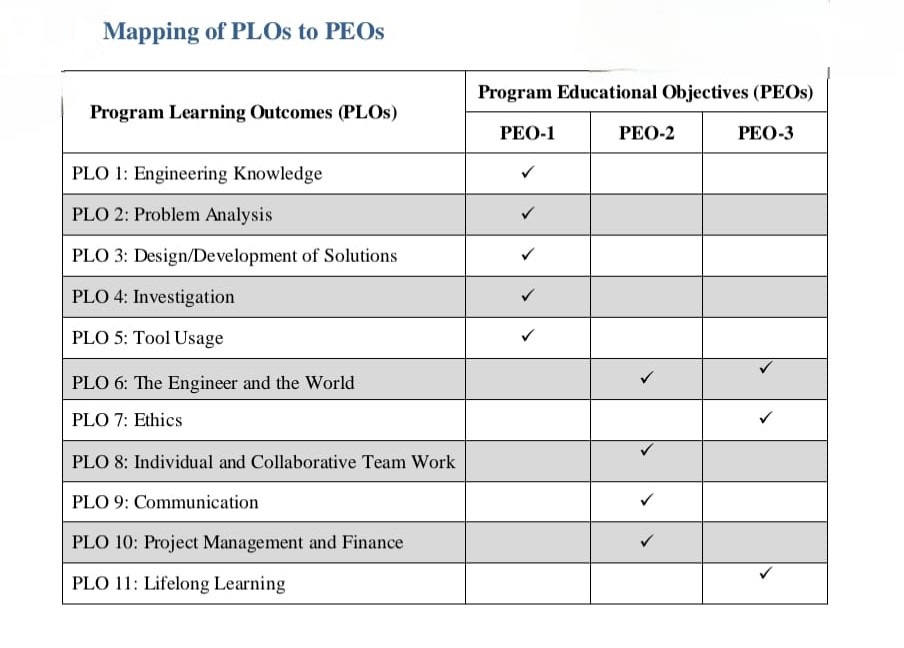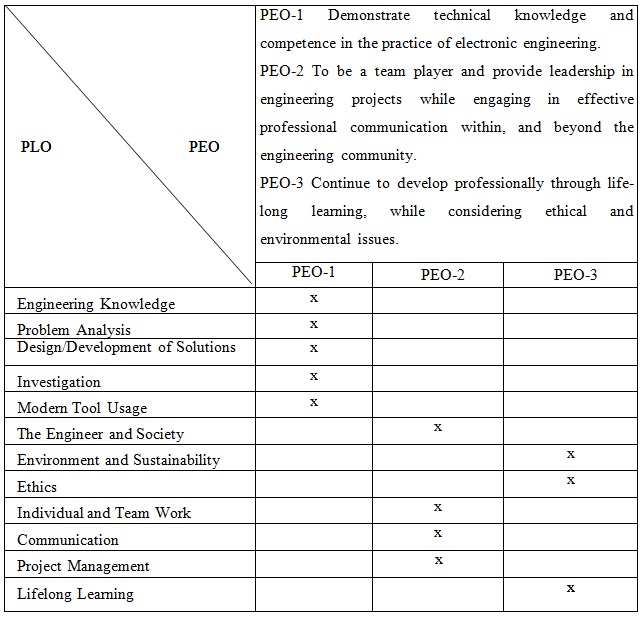VISION OF NED UNIVERSITY OF ENGINEERING & TECHNOLOGY
Be a leader in enabling Pakistan's social and economic transformation.
VISION OF ELECTRONIC ENGINEERING DEPARTMENT
Department of Electronic Engineering aims to impart high quality education to students by providing a learning environment to develop their knowledge and skills. It is our aim to create the globally competitive electronic engineers enabling them to serve the society through sustainable engineering principles and practices.
MISSION OF NED UNIVERSITY OF ENGINEERING & TECHNOLOGY
Acquire education and research excellence in engineering and allied disciplines to produce leadership and enabling application of knowledge and skills for the benefit of the society with integrity and wisdom.
MISSION OF ELECTRONIC ENGINEERING PROGRAMME
The mission of the Electronic Engineering Programme is to equip the students with engineering concepts and skills, awareness of the state of the art in electronic engineering, competence for effective communication and an aptitude towards continuously enhancing their knowledge. The students shall be able to leverage these skills in finding an Electronics related employment, pursue Post-Graduate Studies, and/or commence entrepreneurial activity while contributing towards the betterment of the society.
PROGRAM EDUCATIONAL OBJECTIVES (PEOs)
PEO-1: Demonstrate technical knowledge and competence in the practice of electronic engineering.
PEO-2: To be a team player and provide leadership in engineering projects while engaging in effective professional communication within and beyond the engineering community.
PEO-3: Continue to develop professionally through life-long learning, while considering ethical and environmental issues.
PROGRAM LEARNING OUTCOMES (PLOs) Effective from Batch 2025 and onwards
PLO-1 (Engineering Knowledge): Apply knowledge of mathematics, natural science, engineering fundamentals, and Engineering specialization to the solution of complex engineering problems.
PLO-2 (Problem Analysis): Identify, formulate, conduct research literature, and analyze complex Engineering problems reaching substantiated conclusions using the first principles of mathematics, natural sciences, and engineering sciences.
PLO-3 (Design/Development of Solutions): An ability to design solutions for complex engineering problems and design systems, components, or processes that meet specified needs with appropriate consideration for public health and safety, cultural, societal, and environmental considerations.
PLO-4 (Investigation): Conduct investigation of complex Engineering problems using research-based knowledge and research methods, including design of experiments, analysis and interpretation of data, and synthesis of information to provide valid conclusions.
PLO-5 (Tool Usage): Create, select, and apply appropriate techniques, resources, and modern engineering and IT tools, including prediction and modeling, to complex Engineering problems, with an understanding of the limitations.
PLO-6 (The Engineer and the World): Analyze and evaluate sustainable development impacts to society, the economy, sustainability, health and safety, legal frameworks, and the environment while solving complex engineering problems.
PLO-7 (Ethics): Apply ethical principles and commit to professional ethics and norms of engineering practice and adhere to relevant national and international laws. Demonstrate an understanding of the need for diversity and inclusion.
PLO-8 (Individual and Collaborative Team Work): Function effectively as an individual, and as a member or leader in diverse and inclusive teams and in multi-disciplinary, face-to-face, remote, and distributed settings.
PLO-9 (Communication): Communicate effectively and inclusively on complex engineering activities with the engineering community and with society at large, such as being able to comprehend and write effective reports and design documentation, and make effective presentations, taking into account cultural, language, and learning differences.
PLO-10 (Project Management and Finance): Demonstrate knowledge and understanding of engineering management principles and economic decision-making and apply these to one’s own work, as a member and leader in a team, to manage projects in multidisciplinary environments.
PLO-11 (Lifelong Learning): Recognize the need for, and have the preparation and ability for i) independent and life-long learning ii) adaptability to new and emerging technologies, and iii) critical thinking in the broadest context of technological change.
PLOs TO PEOs MAPPING
 |
PROGRAM LEARNING OUTCOMES (PLOs) Applicable from Batch 2015-16 till Batch 2024
PLO-1 (Engineering Knowledge): An ability to apply knowledge of mathematics, science, engineering fundamentals and an engineering specialization to the solution of complex engineering problems.
PLO-2 (Problem Analysis): An ability to identify, formulate, research literature, and analyze complex engineering problems reaching substantiated conclusions using first principles of mathematics, natural sciences and engineering sciences.
PLO-3 (Design/Development of Solutions): An ability to design solutions for complex engineering problems and design systems, components or processes that meet specified needs with appropriate consideration for public health and safety, cultural, societal, and environmental considerations
PLO-4 (Investigation): An ability to investigate complex engineering problems in a methodical way including literature survey, design and conduct of experiments, analysis and interpretation of experimental data, and synthesis of information to derive valid conclusions.
PLO-5 (Modern Tool Usage): An ability to create, select and apply appropriate techniques, resources, and modern engineering and IT tools, including prediction and modeling, to complex engineering activities, with an understanding of the limitations.
PLO-6 (The Engineer and Society): An ability to apply reasoning informed by contextual knowledge to assess societal, health, safety, legal and cultural issues and the responsibilities relevant to professional engineering practice and solution to complex engineering problems.
PLO-7 (Environment and Sustainability): An ability to understand the impact of professional engineering solutions in societal and environmental contexts and demonstrate knowledge of and need for sustainable development.
PLO-8 (Ethics): Apply ethical principles and commit to professional ethics and responsibilities and norms of engineering practice.
PLO-9 (Individual and Team Work): To enable them to work effectively, as an individual or in a team, on multifaceted and /or multidisciplinary settings.
PLO-10 (Communication): An ability to communicate effectively, orally as well as in writing, on complex engineering activities with the engineering community and with society at large, such as being able to comprehend and write effective reports and design documentation, make effective presentations, and give and receive clear instructions.
PLO-11 (Project Management): An ability to demonstrate management skills and apply engineering principles to ones own work, as a member and/or leader in a team, to manage projects in a multidisciplinary environment.
PLO-12 (Lifelong Learning): An ability to recognize importance of, and pursue lifelong learning in the broader context of innovation and technological developments.
PLOs TO PEOs MAPPING
|
|

